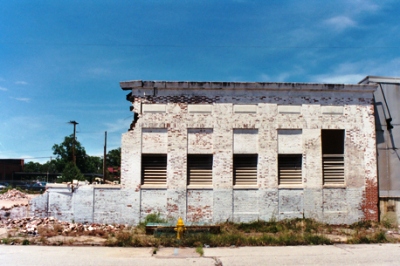
Okay, I'm still clearing the decks here at the City of Dust, so it's gonna be another outtakes post. Next time I'll have a few new rolls of film and a few new places to go. But this time I thought I'd say a little bit about what caused me to take hundreds and hundreds of photos of the crumbling corners and forgotten back alleys of the Augusta area in the first place. This is a picture of what was one of my favorite buildings in downtown Augusta. It was kitty-corner to the Meathouse, on desolate Walker St. As you can see, this is a document of the beginning of the end, but I've got some earlier photos that make it look downright cute. Unfortunately, they aren't digitized, so I can't post 'em. One morning I was roaming around and saw smoke coming from the abandoned lot across from this building. There's a lot of debris and wood over there, so I thought there might be a fire. When I went to check it out I realized it was just somone cooking their breakfast. We nodded good morning to each other and I was on my way again.
I moved to Athens, GA, home of the University of Georgia, from the Upper Midwest in the fall of 2001, and immediately found myself at odds with the town. It seemed to be a toy town, where kids just out of high school believed they'd been sent to paradise because they could get drunk and throw up in the streets and their parents might not know about it.
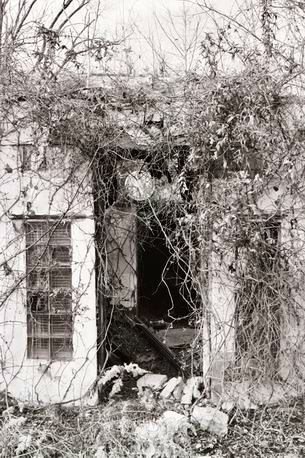 Despite its reputation as a "MUSIC TOWN" I quickly gave up on going out. Even Iggy Pop, who can do no wrong live, seemed to get lost in the muddy sound and roller rink ambience of Athen's premiere venue. I saw only one truly great gig. Carla Bozulich of the Geraldine Fibbers performed a beautiful rendition of Willie Nelson's Red-Headed Stranger album to 15 people in the middle of the night at the Caledonia Lounge. She sang the final song sans microphone while sitting on the bar at the back of the room. But that was the exception that proved the rule. Mostly I was having a really bad time. This is the main entrance to the mission. The sign above the door says, "Jesus Christ Saves," which you can see in the original post.
Despite its reputation as a "MUSIC TOWN" I quickly gave up on going out. Even Iggy Pop, who can do no wrong live, seemed to get lost in the muddy sound and roller rink ambience of Athen's premiere venue. I saw only one truly great gig. Carla Bozulich of the Geraldine Fibbers performed a beautiful rendition of Willie Nelson's Red-Headed Stranger album to 15 people in the middle of the night at the Caledonia Lounge. She sang the final song sans microphone while sitting on the bar at the back of the room. But that was the exception that proved the rule. Mostly I was having a really bad time. This is the main entrance to the mission. The sign above the door says, "Jesus Christ Saves," which you can see in the original post. I started going on long bike rides in any direction AWAY from downtown. Athens is also a pretty bad place to ride your bike if you don't want to get hit by a car. Or ride over broken bottles. No one uses the sidewalks outside of downtown and so I'd ride on those only to have other bikers yell at me to get off the sidewalk and ride in the street like them. Yeah, right.
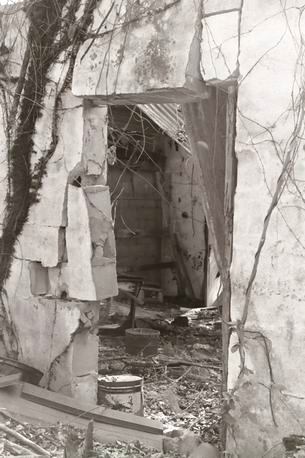 I quickly came across a massive housing development that was just getting underway. There was dirt piled-up all over the place and plenty of little trails to explore. Good mountain-biking terrain. Plus, construction seemed to be moving at a snail's pace. Just beyond the last bulldozer path, in a remnant of forest, was an old farmhouse and barn, probably from the turn of the 20th century. On every ride I'd stop, go inside, and take a break from the sun, which had suddenly become my enemy. I drank a lot of water and ate a lot of power bars in there. The house had a nice patio, a crumbling chimney, and a rickety ladder led to a loft, where I imagine the kids might've slept. Sometimes turkey vultures would startle me by clattering around on the tin roof. This is another, and less stable, entrance to the mission.
I quickly came across a massive housing development that was just getting underway. There was dirt piled-up all over the place and plenty of little trails to explore. Good mountain-biking terrain. Plus, construction seemed to be moving at a snail's pace. Just beyond the last bulldozer path, in a remnant of forest, was an old farmhouse and barn, probably from the turn of the 20th century. On every ride I'd stop, go inside, and take a break from the sun, which had suddenly become my enemy. I drank a lot of water and ate a lot of power bars in there. The house had a nice patio, a crumbling chimney, and a rickety ladder led to a loft, where I imagine the kids might've slept. Sometimes turkey vultures would startle me by clattering around on the tin roof. This is another, and less stable, entrance to the mission. 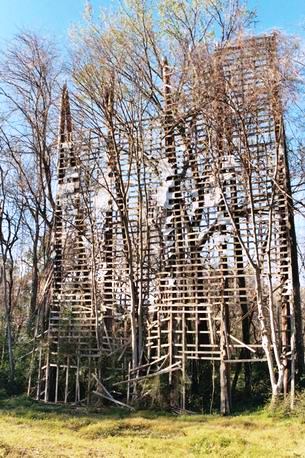 In the summer of 2002 I had to go to Augusta to do some research. No one I talked to liked Augusta. I'd heard it called a "dump" and "Disgusta." But once I moved there I liked it immediately. The Savannah River and the Augusta Canal were good for canoeing, walking, and biking and the town seemed to have more, well, SOUL, than Athens. Hello, James Brown. People worked and did the things people do. Life was not about bar-hopping and football. It was about bar-hopping and golf. That's a joke. Sort of. Anyway, sure, it has its bad points. The downtown is a bombed-out wreck for the most part. Of course, that sorta suited me, and so I went exploring right off. In fairness, downtown is being revitalized even as I type this, and with some success. I don't know what the hell this is a picture of. I like to think it's the screen from a long gone drive-in movie theater. It's probably an old billboard. It's off Sandbar Ferry, just down from the Goodale Inn.
In the summer of 2002 I had to go to Augusta to do some research. No one I talked to liked Augusta. I'd heard it called a "dump" and "Disgusta." But once I moved there I liked it immediately. The Savannah River and the Augusta Canal were good for canoeing, walking, and biking and the town seemed to have more, well, SOUL, than Athens. Hello, James Brown. People worked and did the things people do. Life was not about bar-hopping and football. It was about bar-hopping and golf. That's a joke. Sort of. Anyway, sure, it has its bad points. The downtown is a bombed-out wreck for the most part. Of course, that sorta suited me, and so I went exploring right off. In fairness, downtown is being revitalized even as I type this, and with some success. I don't know what the hell this is a picture of. I like to think it's the screen from a long gone drive-in movie theater. It's probably an old billboard. It's off Sandbar Ferry, just down from the Goodale Inn. 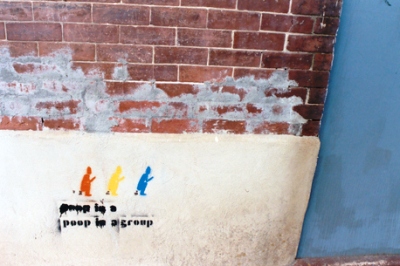
At the end of the summer of 2002 I had to head back to Athens. I didn't want to go and waited until the very last minute to make my way up GA 78. As soon as I arrived I went for a ride out to the housing development. They'd picked up speed in the months I'd been gone and there were probably a couple hundred new homes, some with people already moved in. I rode out to the farmhouse and found that it'd been torn down and ground into mulch with the rest of the woods. I kicked myself for not at least getting some photos of it. I'd never owned a camera in my life and could count the actual pictures I'd taken on one hand. But, still, I figured I coulda bought a disposable and gotten some documentation. I was bummed. That broken old house had felt like a refuge of sorts, quiet and seemingly far away from the problems that plagued me. It was an omen, the beginning of a bleak year. This is some odd graffiti from outside the Rooming House. Heed it at your own risk.
And so it was that when I moved back to Augusta for a long stretch in the spring of 2003 I bought a few disposable cameras and took some pictures of some of the old buildings I liked best around town. As I mentioned back in the Meathouse, I've been exploring old buildings since I was a kid. But I'd never taken photos of them. The pictures looked good to me, so I took more. I quickly realized that there were limitations to disposable cameras; poor flashes, and, worst, the viewfinder doesn't always correspond to what's gonna be in the picture.
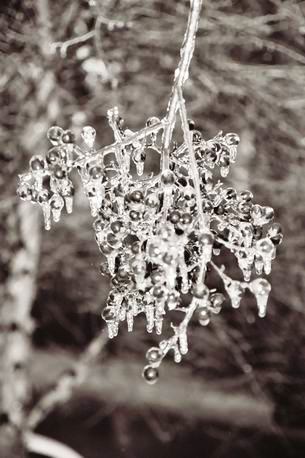 For Christmas 2003 my brother bought me the first camera I'd ever owned, although he couldn't understand why I wanted a film camera. I like not always knowing quite what I'll be getting and I also like the fact that each photo counts; I can't just take 30 shots of the same thing until I get one I like. My way of looking at things started to change as every half-destroyed building and rotting barn became even more aesthetically interesting. I naively thought I was doing something unique. Initially, I felt like I'd been scooped when I saw DETROITBLOG, ABANDONED PLACES, MODERN RUINS, STAHLART, and others. But I quickly took comfort in knowing there were plenty of other weirdos out there. On January 25, 2004, a major ice storm hit Augusta. My roommate and I, both being from the Midwest, considered going to work anyway. Then I saw a statement issued by the National Weather Service: "Leaving your home may result in death." I immediately left my home and took this photo...in the driveway. Another severe ice storm hit Georgia this week. Enjoy, you guys.
For Christmas 2003 my brother bought me the first camera I'd ever owned, although he couldn't understand why I wanted a film camera. I like not always knowing quite what I'll be getting and I also like the fact that each photo counts; I can't just take 30 shots of the same thing until I get one I like. My way of looking at things started to change as every half-destroyed building and rotting barn became even more aesthetically interesting. I naively thought I was doing something unique. Initially, I felt like I'd been scooped when I saw DETROITBLOG, ABANDONED PLACES, MODERN RUINS, STAHLART, and others. But I quickly took comfort in knowing there were plenty of other weirdos out there. On January 25, 2004, a major ice storm hit Augusta. My roommate and I, both being from the Midwest, considered going to work anyway. Then I saw a statement issued by the National Weather Service: "Leaving your home may result in death." I immediately left my home and took this photo...in the driveway. Another severe ice storm hit Georgia this week. Enjoy, you guys. 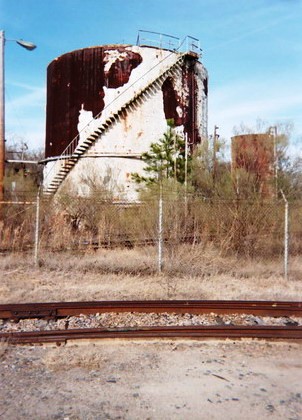 Here's one of my favorite quotes from Ulysses, by James Joyce: "Gone too from the world, Averroes and Moses Maimonides, dark in mien and movement, flashing in their mocking mirrors the obscure soul of the world, a darkness shining in the brightness which brightness could not comprehend." I think the best photos of decay are like that; a darkness shining in the brightness. Ah geez, maybe I'm being pretentious. They're just photos of things that are falling down. Quoting Joyce is fun because you can make him say anything you like, whether your purposes require poetry, vulgarity, or out-and-out nonsense. Here's a storage tank by an old industrial area just beyond the Savannah River, near the new I-520 bridge. There was a nice abandoned warehouse nearby, but I didn't have my camera the one time we spontaneously decided to explore it. This was an earlier shot with a disposable.
Here's one of my favorite quotes from Ulysses, by James Joyce: "Gone too from the world, Averroes and Moses Maimonides, dark in mien and movement, flashing in their mocking mirrors the obscure soul of the world, a darkness shining in the brightness which brightness could not comprehend." I think the best photos of decay are like that; a darkness shining in the brightness. Ah geez, maybe I'm being pretentious. They're just photos of things that are falling down. Quoting Joyce is fun because you can make him say anything you like, whether your purposes require poetry, vulgarity, or out-and-out nonsense. Here's a storage tank by an old industrial area just beyond the Savannah River, near the new I-520 bridge. There was a nice abandoned warehouse nearby, but I didn't have my camera the one time we spontaneously decided to explore it. This was an earlier shot with a disposable. 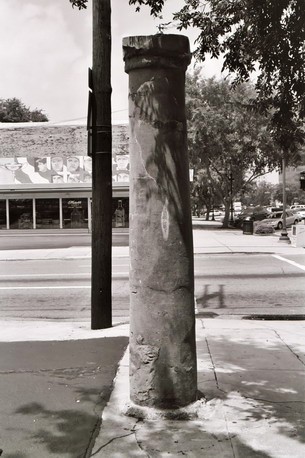 We're gonna finish up with a picture of the haunted pillar from the lower market. I didn't include the photo when I originally discussed the cursed pillar in The Sunny Side of the Street because it didn't seem interesing. The pillar should have a skull on top, I thought, or maybe some bat wings. But there isn't even any blood dripping down it. Then I realized that it was pretty evil of the pillar to be so unassuming, luring victims toward it with no warning. So here it is, right off Broad St. Beware. Hey, I know it takes me awhile to get a new post up. They often take more than one sitting and I have to rifle around my room looking for odd bits of paper and then scour the internet for more info. Finally, I have to collate it all into something half-comprehensible. I hope ya'll will buy the "quality vs. quantity" argument. Okay, no more outtakes next time. I swear.
We're gonna finish up with a picture of the haunted pillar from the lower market. I didn't include the photo when I originally discussed the cursed pillar in The Sunny Side of the Street because it didn't seem interesing. The pillar should have a skull on top, I thought, or maybe some bat wings. But there isn't even any blood dripping down it. Then I realized that it was pretty evil of the pillar to be so unassuming, luring victims toward it with no warning. So here it is, right off Broad St. Beware. Hey, I know it takes me awhile to get a new post up. They often take more than one sitting and I have to rifle around my room looking for odd bits of paper and then scour the internet for more info. Finally, I have to collate it all into something half-comprehensible. I hope ya'll will buy the "quality vs. quantity" argument. Okay, no more outtakes next time. I swear.
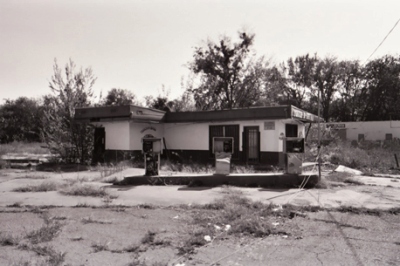
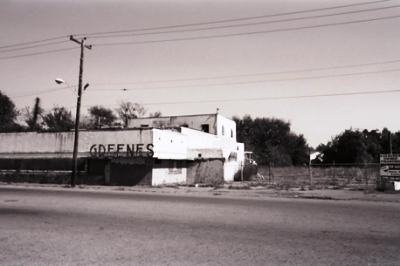
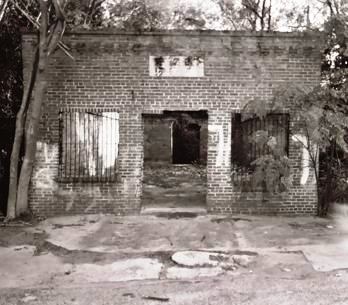
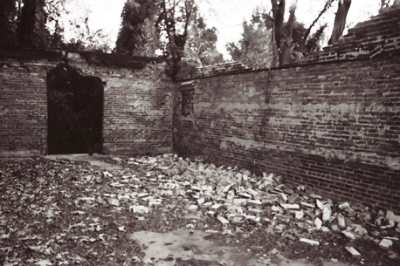
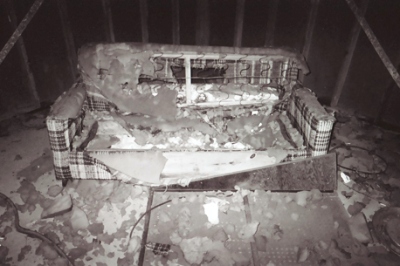
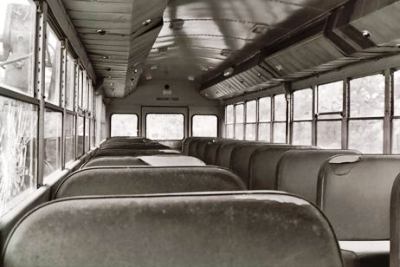
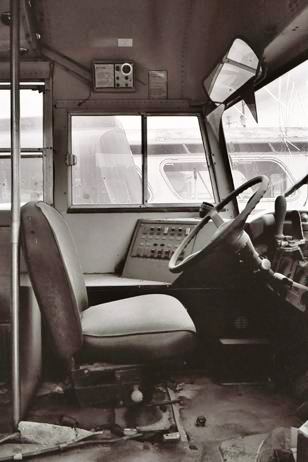 Those two corners, then, would've been the absolute center of the blues at the time. Johnson's recordings were exclusively spirituals, and with the quavering, stinging slide they are some of the most haunting songs I've ever heard. His recording of "Dark Was the Night...Cold Was the Ground," featuring no words, only Willie's soft humming of the melody, is one of the most evocative songs in the history of American music. Incidentally, Willie's version of this song formed the basis of the soundtrack for what I consider one of the best movies ever made, Wim Wender's Paris, Texas. It's easy to see why Ry Cooder based an entire soundtrack around the song. Hell, you could base your life around the song. Unfortunately, the Depression cut Willie's recording career short. In the 1940's, the house Willie shared with his wife burned down. With nowhere else to go, the couple slept on their old mattresses, still wet from the firehoses, covering themselves with newspaper. Willie contracted pneumonia as a result and, being broke and blind, no hospital would see him. Thus the world's greatest slide guitar player died, leaving thirty songs, one photo, and the charred bridge of his guitar, burned in the fire, as the only evidence.
Those two corners, then, would've been the absolute center of the blues at the time. Johnson's recordings were exclusively spirituals, and with the quavering, stinging slide they are some of the most haunting songs I've ever heard. His recording of "Dark Was the Night...Cold Was the Ground," featuring no words, only Willie's soft humming of the melody, is one of the most evocative songs in the history of American music. Incidentally, Willie's version of this song formed the basis of the soundtrack for what I consider one of the best movies ever made, Wim Wender's Paris, Texas. It's easy to see why Ry Cooder based an entire soundtrack around the song. Hell, you could base your life around the song. Unfortunately, the Depression cut Willie's recording career short. In the 1940's, the house Willie shared with his wife burned down. With nowhere else to go, the couple slept on their old mattresses, still wet from the firehoses, covering themselves with newspaper. Willie contracted pneumonia as a result and, being broke and blind, no hospital would see him. Thus the world's greatest slide guitar player died, leaving thirty songs, one photo, and the charred bridge of his guitar, burned in the fire, as the only evidence. 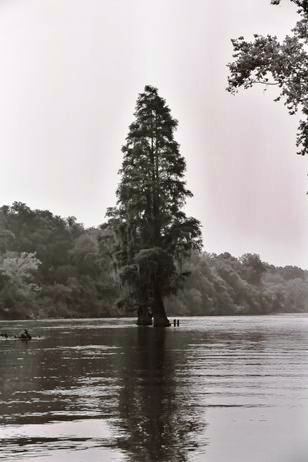 And he was protective of his technique, leaving a room in mid-song if he thought someone was studying his moves. He also developed a taste for whiskey and women. Upon arrival in a town, Johnson would look for the homeliest woman around, knowing that if he treated her nice she'd give him food, shelter, liquor, and a few other things as well. But it was his womanizing that was his undoing, and one night, in the fall of 1938, Johnson began eyeing a woman at a juke joint gig. He was playing with Sonny Boy Williamson, who warned him that things were getting heavy, going so far as to knock an open bottle of whiskey someone had given Johnson out of his hand. Johnson was furious at this waste of good alcohol, and when the next bottle came by, he drank. Within three days he was dead, poisoned by the husband of the woman he was flirting with. He was 27 years old. The picture is of a single cypress tree, taken while knee deep in water below the Savannah River rapids.
And he was protective of his technique, leaving a room in mid-song if he thought someone was studying his moves. He also developed a taste for whiskey and women. Upon arrival in a town, Johnson would look for the homeliest woman around, knowing that if he treated her nice she'd give him food, shelter, liquor, and a few other things as well. But it was his womanizing that was his undoing, and one night, in the fall of 1938, Johnson began eyeing a woman at a juke joint gig. He was playing with Sonny Boy Williamson, who warned him that things were getting heavy, going so far as to knock an open bottle of whiskey someone had given Johnson out of his hand. Johnson was furious at this waste of good alcohol, and when the next bottle came by, he drank. Within three days he was dead, poisoned by the husband of the woman he was flirting with. He was 27 years old. The picture is of a single cypress tree, taken while knee deep in water below the Savannah River rapids.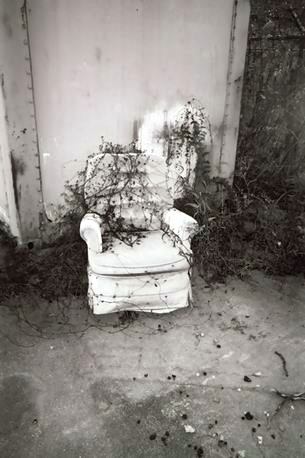 Don't believe in ghosts? You should. Every time I'm stopped for a train, and it's late at night, I'll see the flashing red lights of the crossing guard, turn to watch the lights of the train fade into the distance, and hum, "Well, the blue light was my blues, and the red light was my mind. All my love's in vain." Melodramatic? Well, nothing's made sense since Brad and Jen broke up, has it? So, sleep it off in a comfy chair behind an old Chinese restaurant near Washington Rd. Oh yeah, virtually every artist I've mentioned can be found on re-releases through Columbia Records Roots n' Blues series. They've done some nice packages and, sure, I admit to borrowing from the occasional liner note for this post. There's audio snippets for each track from just about every release, so you can hear a few seconds of Robert Johnson and Blind Willie (both of 'em) doing their thing.
Don't believe in ghosts? You should. Every time I'm stopped for a train, and it's late at night, I'll see the flashing red lights of the crossing guard, turn to watch the lights of the train fade into the distance, and hum, "Well, the blue light was my blues, and the red light was my mind. All my love's in vain." Melodramatic? Well, nothing's made sense since Brad and Jen broke up, has it? So, sleep it off in a comfy chair behind an old Chinese restaurant near Washington Rd. Oh yeah, virtually every artist I've mentioned can be found on re-releases through Columbia Records Roots n' Blues series. They've done some nice packages and, sure, I admit to borrowing from the occasional liner note for this post. There's audio snippets for each track from just about every release, so you can hear a few seconds of Robert Johnson and Blind Willie (both of 'em) doing their thing.
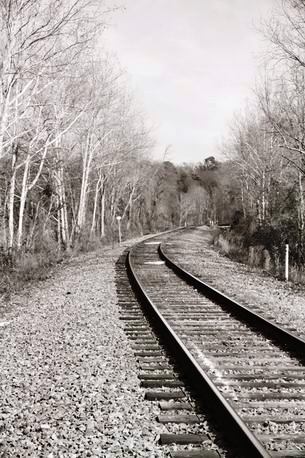
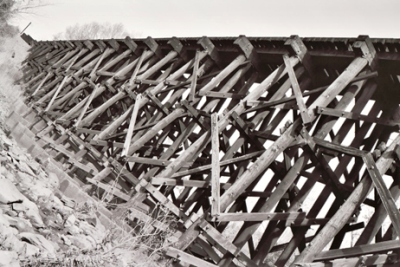
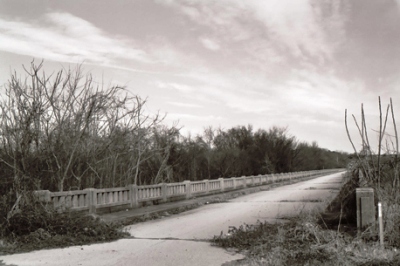
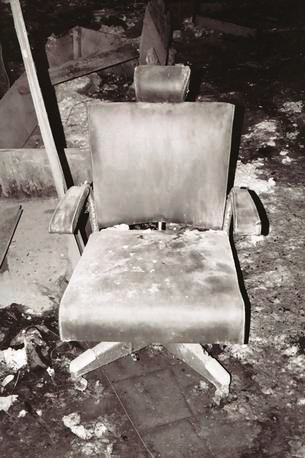

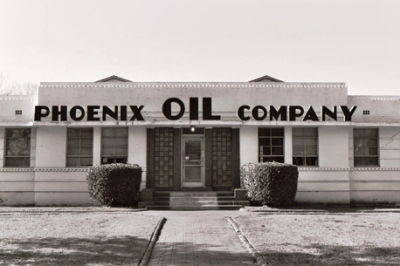
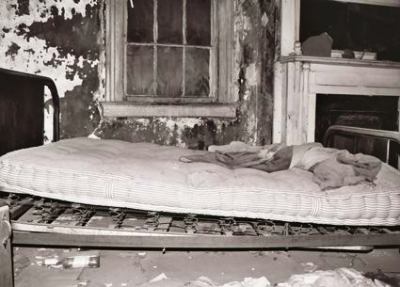
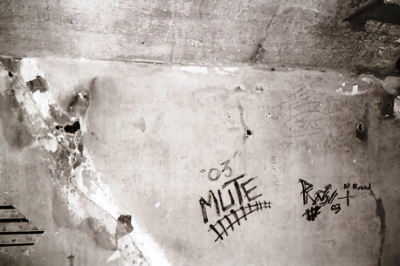
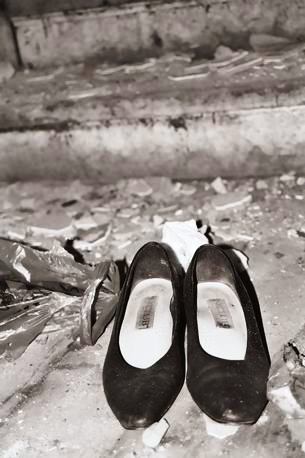

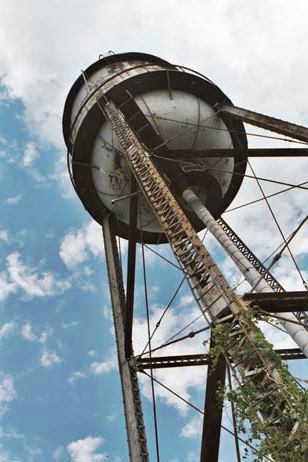
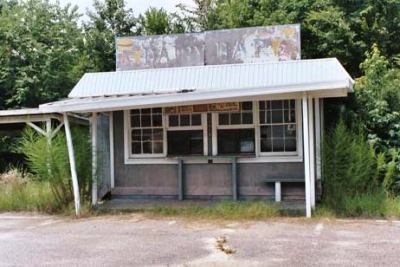

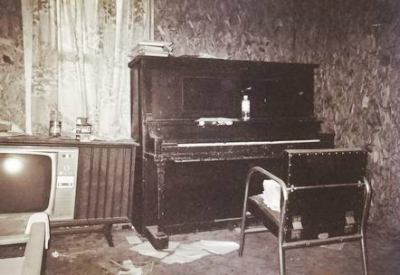




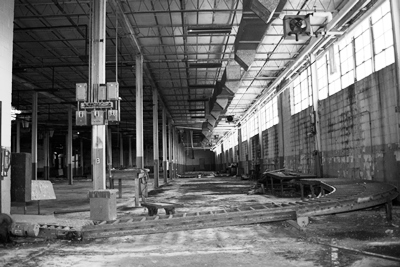
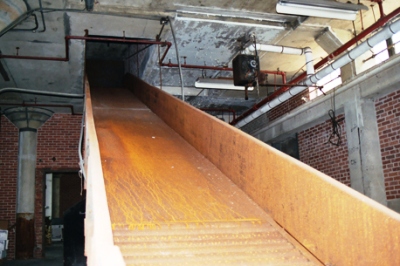

 In 1829, the voting rights of poor Irish peasants were rescinded. Here's what Richard Pearce said: "No longer politically useful and unable to pay rent, the cottier peasant and his family were driven from what little holdings they had and literally placed on the ship that was to carry them on one of the most extraordinary migrations in history. To understand the scale of this social upheaval, for example, during just three years from 1849-51 over a million persons were evicted by Irish landlords. To these vast numbers of newly dispossessed families, the destination mattered little. For Irish immigration during these terrible decades was an exodus, a flight. Oscar Handlin, the noted historian of Boston's immigrant population, quotes The Cork Examiner: 'The immigrants of this year are not like those of former ones; they are now actually running away from fever and disease and hunger, with money scarcely sufficient to pay passage for and find food for the voyage.'" This explains all the Irish graves in Magnolia cemetery (see:
In 1829, the voting rights of poor Irish peasants were rescinded. Here's what Richard Pearce said: "No longer politically useful and unable to pay rent, the cottier peasant and his family were driven from what little holdings they had and literally placed on the ship that was to carry them on one of the most extraordinary migrations in history. To understand the scale of this social upheaval, for example, during just three years from 1849-51 over a million persons were evicted by Irish landlords. To these vast numbers of newly dispossessed families, the destination mattered little. For Irish immigration during these terrible decades was an exodus, a flight. Oscar Handlin, the noted historian of Boston's immigrant population, quotes The Cork Examiner: 'The immigrants of this year are not like those of former ones; they are now actually running away from fever and disease and hunger, with money scarcely sufficient to pay passage for and find food for the voyage.'" This explains all the Irish graves in Magnolia cemetery (see: 

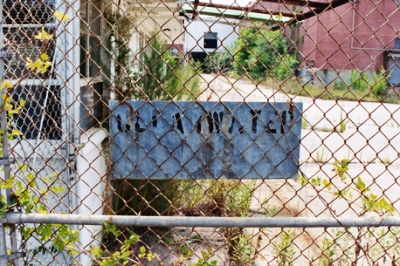
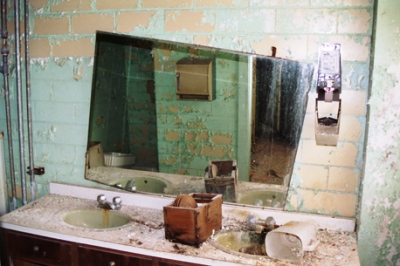
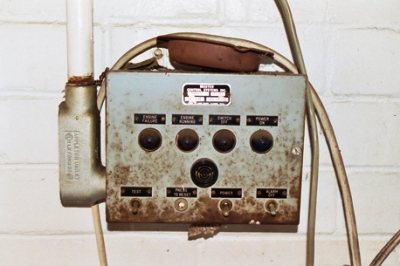
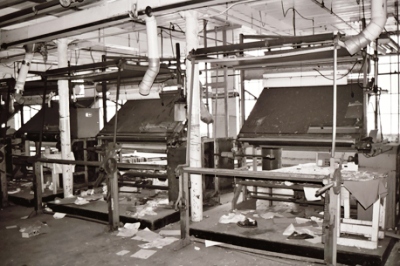
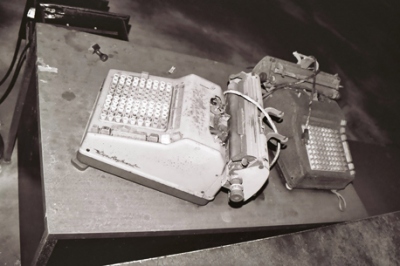



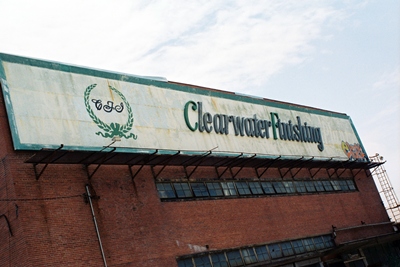

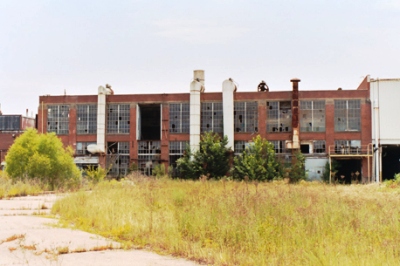
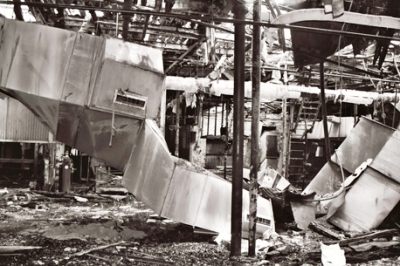
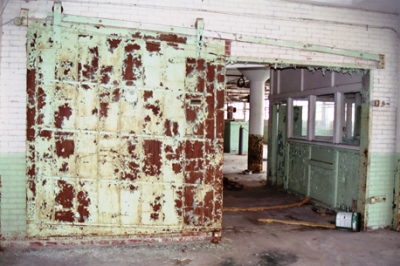


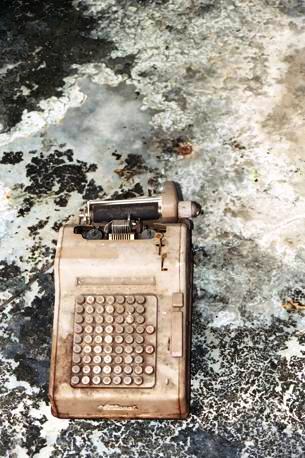 In one section of the mill thousands of pieces of ancient computer equipment were strewn all around, some of it brand new. If you're looking for giant floppy discs, punch-card readers, and obsolete monitors, the plastic casing yellowed and coated in dust, well, it's out there. Elsewhere, old adding machines, rubber stamps, and discarded reams of fabric were lying on desks and stacked on shelves.
In one section of the mill thousands of pieces of ancient computer equipment were strewn all around, some of it brand new. If you're looking for giant floppy discs, punch-card readers, and obsolete monitors, the plastic casing yellowed and coated in dust, well, it's out there. Elsewhere, old adding machines, rubber stamps, and discarded reams of fabric were lying on desks and stacked on shelves.